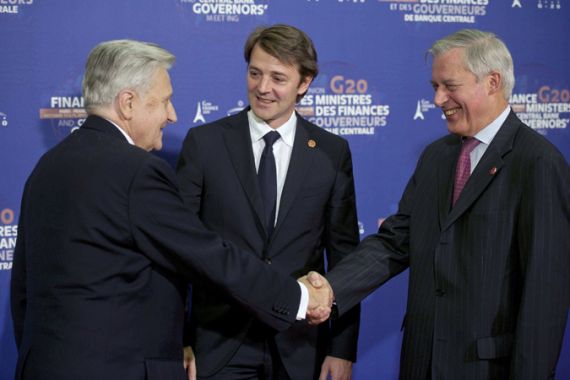Eurozone debt crisis tops G20 agenda
Meeting of finance ministers in Paris reveals divisions over who should be responsible for tackling eurozone crisis.

 |
| G20 finance ministers and bankers are doing the groundwork ahead of next month’s full summit in Cannes [Reuters] |
Finance ministers and central bankers from the G20 economies are meeting in Paris, the French capital, with efforts to tackle the debt crisis in Europe at the top of the agenda.
Pressure mounted on Friday amid divisions over whether the eurozone should take full responsibility for its escalating debt crisis, or whether the rest of the world should help out more.
Keep reading
list of 4 itemsWhy are nations racing to buy weapons?
Parallel economy: How Russia is defying the West’s boycott
US House approves aid package worth billions for Ukraine, Israel
A proposal to double the size of the International Monetary Fund (IMF) as part of a broader international response to Europe’s crisis has been met with some resistance by the US.
Timothy Geithner, the US treasury secretary, said he believed the current resources of the IMF and EU were enough to deal with the debt crisis.
“As we look at the world today, the IMF has very substantial, uncommitted, available financial resources.
“The problems that they are facing there in Europe are complicated to solve, but well within the resources that Europe has.”
EU ‘clearly moving’
In an interview with CNBC television from Paris, Geithner said: “Europeans must themselves pay the largest part” of the cost of resolving the debt crisis, adding that the EU “is clearly moving” to deal with it.
The G20 leaders are expected to agree on a set of measures to deal with the crisis at a meeting in Cannes next month.
The EU leaders will meet earlier on October 23 to produce a plan that would be convincing for financial markets, according to Wolfgang Schaeuble, German finance minister.
Earlier on Friday, the International credit rating agency Standard & Poor’s downgraded its long-term debt rating for Spain, citing the country’s weak economic growth prospects and risks facing its banks.
Last week, European officials warned that investors are likely to lose more than the 21 per cent on Greek sovereign bonds already agreed on as part of a second bailout for Greece.
Experts say Greece needs to cut its massive debt by around 50 per cent to stabilise its finances.
The measure would send shockwaves through the continent’s financial and banking system, as much by undermining confidence in the debt of other weak eurozone economies.
Signs of optimism
Nevertheless, Christopher Vecchio, an analyst at DailyFX in New York, said the meeting of global finance officials in Paris “has boosted optimism that a credible plan may be in the works.”
As a sign of that optimism, the euro firmed sharply against the dollar on Friday, standing at at $1.3881 in late New York trading up from $1.3783 at the same time on Thursday.
Jim Flaherty, the Canadian finance minister, said: “Clear and decisive action is critical to restoring confidence.”
Meanwhile, Pravin Gordhan, the South African finance minister, said Europe had been “behind the curve” and that solutions were needed in time for the summit of G20 leaders on November 3 and 4.
“We are looking for assurances from our European colleagues that by the time the summit of the G20 takes place, we will have a clear message that will create confidence,” he said.
Unlike his US counterpart, he warned the resources of the International Monetary Fund and Europe’s rescue fund, the European Financial Stability Facility (EFSF), could be “inadequate” if debt contagion spreads further.
After finally getting approval on boosting their EFSF bailout fund to 440 billion euros [$600 billion], eurozone leaders are already studying ways to leverage its funds up to 2.5 billion euros.